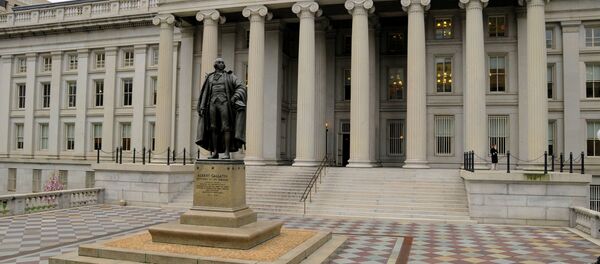Kristian Rouz — As Europe's stock markets opened, a wave of relief was felt amongst financial markets across the world, as equities had their largest rebound in four weeks, with significant gains seen in mining and oil. Mainland China's government now has the ball in their court: after the disappointing 2015 GDP growth data at 6.9%, investors and traders alike are expecting an increased monetary stimulus from Beijing, bolstering the nation's growth and, consequently, its consumption of raw materials. Another positive signal was the fact the oil price has halted at $40/bbl for Chinese consumers, meaning the currently low international prices only reflect temporary concerns of market participants, including the anticipations of Iran's re-accession to the global supply side of crude production. All in all, the hype of a looming global financial crisis has so far proven premature.
European equity markets decisively ended last week's massive trading slump, rebounding in oil, mining and utilities on the widespread expectations of mainland China further stimulating their economy to take off from the sluggish 6.9% annualized growth posted in 2015. Coupled with yesterday's positive signals across the domestically-driven sectors like telecoms and manufacturing, the Chinese factor propelled European stocks significantly higher, effectively ending the financial crisis scare.
Supporting the optimistic expectations, mainland China's oil price was reported as ‘stuck' at no lower than $40/bbl, according to National Development and Reform Commission in Beijing. Retail petrol prices in the mainland are ‘locked' at a level corresponding to $40/bbl oil, not least because of the Chinese regulators' concerns over looming disinflation, and, consequently, an even slower growth.
In Addition, while China is buying oil below the $40/bbl level from the international market, Chinese consumers are still overpaying for petrol, supporting both the national oil companies and, ultimately, the government, as outlined in Morgan Stanley observations.
"While the headline news looks very positive, we believe the majority of the extra profit will be taken by the government," Morgan Stanley noted in their research paper. "Refiners are only likely to see minor positives."
Another positive development in global finance, helping to fend off a new crisis, is the decisive central bank action in the United States. Whilst the US Federal Reserve has been tightening their monetary policies since 2013, there are still significant elements of monetary stimulus remaining in central banks' activities, aside from maintaining the persistently low interest rates.
This year, the amount of maturing debt to be reinvested, would account for some $216 bln worth of Treasuries (last year, almost none of the Fed-held Treasuries were expiring, thus no reinvestment debate).
"The Fed tightening gave us little worry, but the unwind of the balance sheet gives us major worries," Mark MacQueen of the Austin, TX-based wealth management firm Sage Advisory Services Ltd. "The Fed is keenly aware that the balance sheet has a much greater impact on the overall yield levels in the markets going forward than raising rates."
Overall, the Fed signaled they would keep hold of the $2.5 trln worth of US debt, though abstaining from expanding their balance sheet. In 2009, the regulator only held some $500 bln worth of Treasuries.
Consequently, with the US economy gaining support from the roughly $200 bln worth of lend-ready liquidity in 2016 and mainland China likely driving raw materials prices to avoid its own economic demise, the threat of a global financial crisis might effectively fade for another couple of years.





